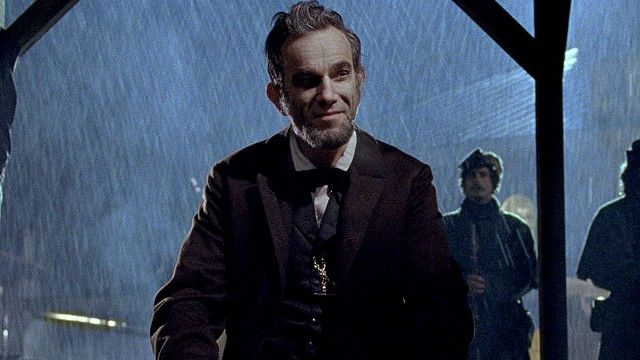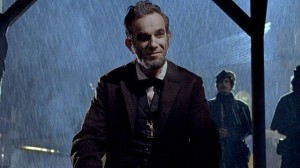by Raj Ranade
Steven Spielberg’s new film Lincoln can often feel like a greatest-hits summary of the director’s career – the only thing it’s missing are dinosaurs (unless you want to count Tommy Lee Jones). It’s a film that shocks the conscience with a raw opening battle scene (Saving Private Ryan), a scene in which African-Americans rise up against the forces oppressing them (Amistad). It’s a movie centrally concerned with the gnawing weight of moral compromise (Munich). And it’s a movie with a keen eye for the specific prejudice encountered by African-American women (The Color Purple), for how children learn to process injustice in the world (at least four different Spielberg movies), and for the unique weight of troubled father-son relationships (pretty much every Spielberg movie). (I don’t think you have to go too far to bring in a Schindler’s List comparison here either, but I’m going to dodge that particular minefield.)
But one of the remarkable things about Lincoln is that for all that familiarity, this grand American film also represents something strikingly new. The film, less a presidential biopic than a story about the machinations needed to ratify the constitutional amendment ending slavery, is a vision of American politics unlike most in Hollywood history. You sense things are different in the first scene involving Lincoln (Daniel Day-Lewis, unrecognizable and powerful), where a group of starstruck soldiers meet their commander-in-chief. Two soldiers breathlessly inform Lincoln that they saw him deliver the Gettysburg address, which they know from heart, but when probed by Lincoln, they admit that they couldn’t actually hear a word while they were in the crowd. But they bought into the legend all the same thanks to the telling of the story afterward. Lincoln is interested in that distance – not just between the man of myth of Lincoln himself, but between the reality of American politics and the idealized fictions we hear about instead.
Hollywood’s ideal political hero, after all, is a Mr. Smith type going to Washington, the tireless public servant who sticks to his values even if it makes him a political martyr. But Lincoln is more interested in the nuts-and-bolts process of political realists, forced to make choices far more difficult than simple right and wrong. There’s the dilemma of Thaddeus Stevens (Tommy Lee Jones, wigged and witty), the crusader for racial equality asked to publicly disavow his at-the-time “radical” beliefs about black voting rights to get anti-slavery legislation passed. There’s the favor-trading and black-mailing by Lincoln’s team of fixers (John Hawkes and a particularly good James Spader, channeling George Clooney’s old-timey doofus persona) as they attempt to wrangle votes from vulnerable congressmen.
And there’s the very way this film frames the slavery issue itself. It’s easy to imagine a film like this about noble anti-slavery advocates fighting mustache-twirling slave-owners. But screenwriter Tony Kushner makes clear that Lincoln’s focus on ending slavery extended the Civil War by months – Spielberg makes a point of including a scene where Lincoln tours the carnage of a battle his decisions could have avoided – and required a certain amount of flat-out illegality. The provocative idea the movie raises is that there’s a heroism in this moral compromise – that the kind of dirty tricks that Lincoln engaged in may tarnish his legacy, but are inextricable from his greatness as a leader. That’s a morally complex idea, and one that you could certainly make a strong argument against. But I think even those who would disagree with that thesis would agree that it’s a viewpoint worth reckoning with. (That the modern political landscape of partisan inflexibility makes this all the more resonant almost goes without saying.)
The thoroughness with which Lincoln explores that quandary is a key part of what makes it a great film, but even more important is the lightness of touch with which it does so. There’s a surprisingly high ratio here between fun cinematic liveliness and textbook detail about the minutiae of governance. Paired with the solemnity is a lively undercurrent of satire, found in the ornate insults tossed back and forth during congressional debates (which play like ancestors of the more explicit put-downs found of HBO’s Veep) and the quips of our central great man himself. As played by Day-Lewis, Lincoln is a careful cultivator of his own image, a learned scholar of Greek literature who was nevertheless expert at deploying some folksy toilet humor when the situation demanded it.
Day-Lewis played one of cinema’s most memorable anti-minority crusaders in Gangs of New York, and his performance here is the opposite not just in content but in demeanor. His Lincoln is as calm and collected as Bill the Butcher was loud and blustery – on the few occasions where the man raises his voice, you get the sense that the strain of such a rare exertion might tear him apart. The film itself is at its best when it, like its hero, is maintaining its cool. While Sally Field and Joseph Gordon-Levitt are better than average as Lincoln’s wife and son, there’s something more pro forma about their subplots than in the rest of the film, and the standard Spielbergian gooey coda seems to actively work against the hard-edged tribute to governance that preceded it. But all that seems minor when you compare it to achievements like Janusz Kaminski’s gorgeous cinematography, which captures the action in the muted grays of period-accurate natural lighting. The images get right to the core of the film – the carefully manicured shots give us impressions of a great man that could have been iconic paintings, but Spielberg makes sure that we as an audience have to probe deeper.










